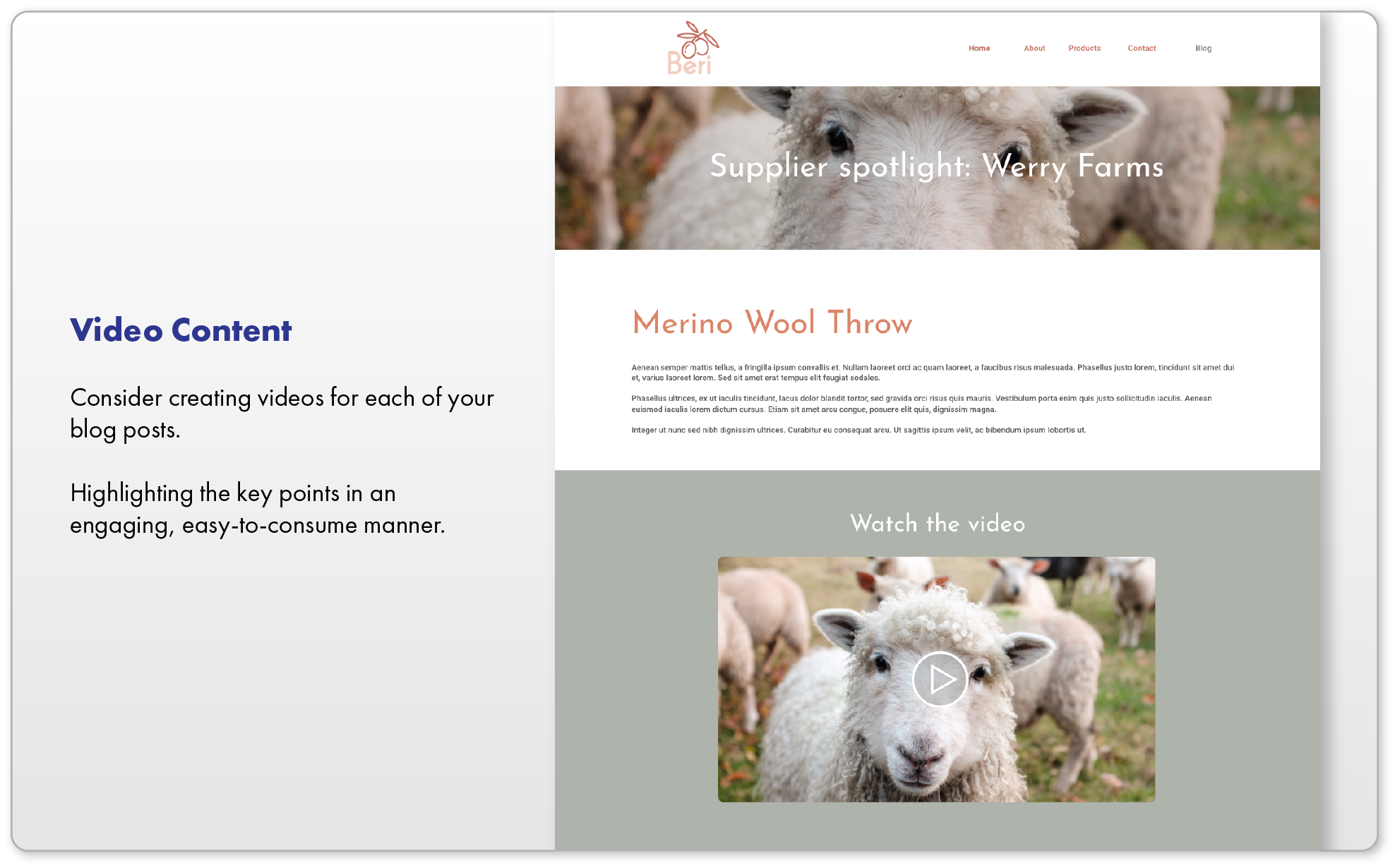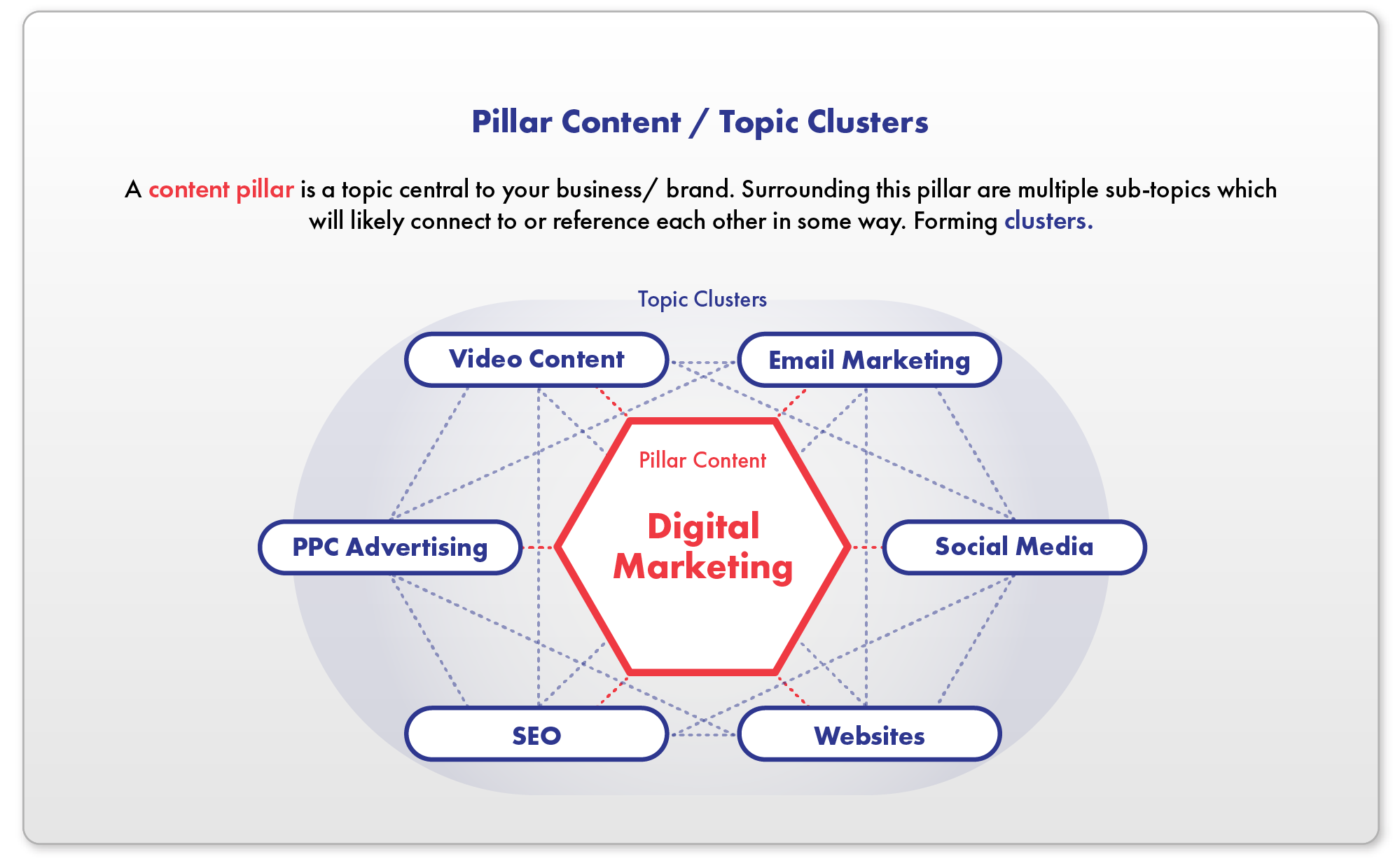Tips for blogging in 2024
Blogging has long been one of the cornerstones of successful SEO. But with rising concerns over spammy practices and lowering search result quality, how will blogging impact SEO in 2024? And what changes, if any should businesses be making?
The relationship between blogging and SEO.
Since the very early days of SEO, blogging has been extremely beneficial in boosting your website’s search ranking.
Allowing you to:
1. Target more keywords
2. Answer your audience’s questions.
3. Prove your authority in your industry/ niche
4. Increase your reach
Targeting more keywords
While search engines are quite nuanced in their understanding of keywords, allowing for synonyms and similar phrases. It is still best practice to focus your attention on one primary keyword or keyphrase per page on your website.
Blogging allows us to do this while maintaining a tidy and easy-to-navigate website. The primary areas of your website can be dedicated to what you do/ sell. While the blog allows you to get into more detail or generate discussion.
Answering your audience’s questions.
Every business and every industry has a handful of frequently asked questions from their audience. Many can be answered in a single sentence e.g. how do I track my order? But others require or would benefit from more insight e.g. Are your products sustainably sourced? For some customers, a simple ‘yes’ would suffice, but others will require more detail.
In this example, you can share a blog article discussing your commitment to sustainability. Detailing how your products and processes are sustainable, any accreditation you may have, acknowledging any areas for improvement, and why sustainable practices are important to your brand. You not only answer the question but you’re building your brand’s messaging. And further connecting with customers who share these values.
Indicating authority
Online, anyone can claim to be whatever they want to be, and proving it can be harder than it seems.
I can claim I am a mathematics expert but if I am unable to explain what a square root is, that claim quickly falls apart. However, if I can not only explain square roots but have a helpful reference article available to read on my website. That’s one step towards showing Google that I am an authority on the topic. Making me a valuable resource for people to come to for more insights. Which in turn encourages Google to rank my content highly.
Increasing reach
This is a simple one; more web pages = more keywords = more search results = more links = more potential reach = more clicks.
If your website only has 1 page that targets 1 keyword, you’ll be harder to find than if you have 50 pages and 50+ keywords. More pages also indicate to Google that your website has a lot to offer. Especially if those keywords are complementary and form topic clusters.
That’s all sounds very encouraging, doesn’t it!?
But when the outcomes are so beneficial, many people start to catch on, about 29% of marketers and business owners now utilize SEO. If the majority of people are utilizing SEO, are search results truly the most accurate for your query? Or simply the most optimized?
Recently there have been increased grumblings that Google search results aren’t what they used to be. This isn’t a new complaint. People have been saying this for a while but it’s also likely not just user sentiment. There’s good evidence to suggest search results are getting worse and many are pointing to SEO as the cause.
Most people can improve their website’s SEO at minimal financial cost if they’re willing to put in the time to research and execute how to do it. Therefore, it’s not hard to argue that search results aren’t entirely relevant or merit-based. A low-quality site can still rank highly if it has good SEO. Obviously, this isn’t ideal for Google or its users, so steps are being taken. to change how websites are assessed and ranked.
That leads us to the big question…
Will blogging still be useful for SEO in 2024 and what are the best practices to improve or maintain good ranking?
Tips for blogging in 2024
Despite the grumblings, SEO isn’t about to disappear anytime soon. And although Google has aggressively reduced the impact of popular SEO tactics in the past that’s unlikely to happen in the near future. What is happening is a shift in the signals Google is now using to identify and share quality content.
The first major changes to expect will be familiar to anyone who dabbles in digital marketing; video content and Authenticity.
Video Content
Video content is now a central pillar of digital marketing. If you don’t already have a video content strategy, start working on one now because you’re already behind. In 2024 Google will start considering the inclusion of relevant video content on websites and blog articles when ranking web pages.
To capitalise on this, consider creating videos for each of your blog posts. Highlighting the key points in an engaging, easy-to-consume manner. That way people who find your video first can visit the blog for more detail and those who visit your blog first can choose to watch the video if they’re short on time.
Authenticity/ Humanity
It’s been floating around the social media sphere for long enough now that it’s beginning to feel like a bit of a buzzword. But it’s actually more relevant than ever.
With the rise of AI people are more likely to connect with content that has a good level of authenticity. People are more likely to connect with your content if they feel there is a real person behind it. As seen in click rates for YouTube thumbnails with people in them, versus those without. Ideally, to help engagement you’d be willing to share your face and name (even if it’s a pseudonym!) alongside your blog articles.
But if you aren’t prepared to put yourself out there in full, there are workarounds. Bringing in an expert to comment on certain aspects of your article will not only bring some humanity to your content but also reinforce what’s being said. You’re not just making empty claims you’ve actually consulted someone with experience on the topic.
Or, if you can’t comment personally on the topic you’re discussing, interview people. Getting quotes from others who have genuine insights adds the human element without bringing your own name into it.
What’s old is new again.
Sometimes old concepts make a comeback, while others never die. These next two tips for blogging in 2024 will be familiar to seasoned digital marketers. Quality and pillar content/ content clusters.
These two metrics appear to be a direct response to for-profit blogs. Websites built around a specific niche with the intent of targeting low competition, high traffic, long tail keywords. Ensuring traffic and generating ad revenue through Google ads or affiliate links. Unlike the spam blogs of the early 2000s, for-profit blogs will often answer your query but don’t offer much substance beyond that.
The need for quality content has never really left but it is becoming harder to work around going forward.
Quality
In the early 2000s blogging became accessible to everyone through sites like blogger.com, and SEO relied heavily on keywords alone. The introduction of AdSense, now Google Ads, created the perfect environment for spam blogs. Low-quality, ad-riddled articles, crammed so full of keywords they were barely readable.
But they worked. Ranking high enough to get clicks and make money for the website owners. So, people kept building them.
As this was affecting the quality of search results, Google cracked down on spam blogging hard by introducing tighter guidelines on keyword count and distribution. While also utilizing more nuanced signals to recongise if the page content was high quality. In the early 2020s high quality meant, well-written, accessible, and worth sharing.
Heading into 2024 ‘high quality’ now includes content that meets the needs of your visitors or has added value. For example, I search ‘How to crochet’ and I find an article that not only answers my question but includes a video tutorial giving me a step-by-step walkthrough. Along with suggested articles such as easy ‘crochet projects for beginners.’
I found exactly what I needed and gained further information I didn’t even know I wanted yet. I liked this blog so much, I shared it on my own website and social media.
Pillar content/ topic clusters
Content pillars and clusters aren’t a new concept either. Since the 2010s this has been popular advice for social media content. However, heading into 2024 it will have a more direct impact on SEO.
A content pillar is a topic central to your business/ brand, for example ‘Digital Marketing’ is a content pillar for us at Tin Can. Surrounding this pillar are multiple sub-topics such as ‘SEO, social media, email marketing, etc’ that we may discuss on our blog, which will likely connect to or reference each other in some way. Creating a nice little web of reference among articles in the same cluster.
If you’ve been blogging for a while you likely already have the beginnings of a cluster. In writing article an article on Thrifting you briefly touch on how to make money as a clothing re-seller and realise that could -and should- be its own article. So you write that too and end up referencing each in the other.
Doing this intentionally will greatly benefit your website going forward. You’ll be generating more content, providing more value to your followers/ visitors, and cementing your authority on this pillar topic. Because if Google can see you have several articles in a cluster, relating to the same pillar. You likely know what you’re talking about.
Make connections and build community.
If your approach to blogging was simply, ticking a box on your SEO checklist you’re probably going to start slipping. If you want to continue successfully blogging in 2024 your end goal should not simply be getting people to your website. It should be building a community.
Hearing this might cause some to roll their eyes but hear me out.
If what you’re putting out is high value, over time you’ll gather fans and followers who like your content and want to see more. Naturally, they’ll want to share it around to their circles or discuss it with fellow fans creating a small community. This type of community is invaluable, because you not only have a captive audience, but you’re also developing brand advocates. People who can help spread your message and expand your reach, for free!
However, fostering this kind of community will take a little more intention than simply posting a monthly blog. To get the best results, you’ll need to do the following:
-
Stick to a regular posting schedule.
Ideally 2 – 6 posts a month.
This way you’ll stay active on your followers’ timelines and forefront in their minds. They know when to expect new content from you and can get excited about it. -
Allow comments and encourage discussion.
Encouraging readers to engage in discussion will further boost the profile of your brand and hopefully generate some thought-provoking insights that may lead to future posts. Community discussion can take place on the blog itself, on social media or in a dedicated forum. Younger communities may need a little nudge to get the ball rolling, so start by replying to as many comments as you can.
-
Keep your social media active.
An active and engaging social media presence is critical to maintaining a wide sales funnel. You don’t need to be on every single platform (it can’t hurt) but you do need to commit to staying active on the ones you do choose to have a presence on.
And those are our primary tips for blogging in 2024.
To recap, you want to focus on:
- Being Authentic
- Creating high-quality content
- Introducing more video
- Identifying and building content pillars and cluster content.
- Building community
Sources:
Hubspot | What is a pillar page
Tweak Your Biz | Why is Google search becoming worse
Blog aspiration Marketing | Is blogging dead?
Google Blogs | Finding more high-quality sites in search
Scribly Media | Google’s helpful content update
Google | 2023 Helpful content system update
Search Engine Journal | Why Google search is getting worse
Semrush | SEO Statistics








